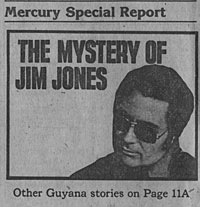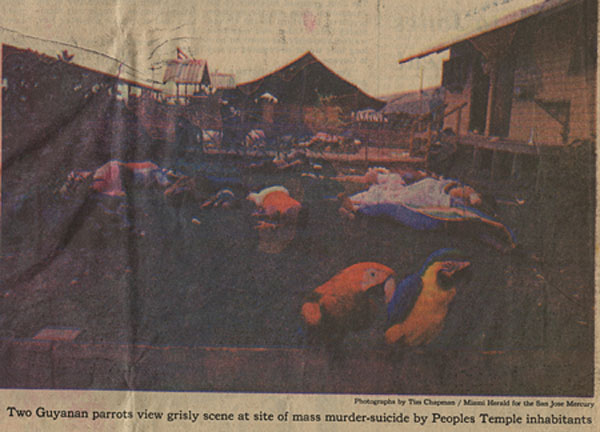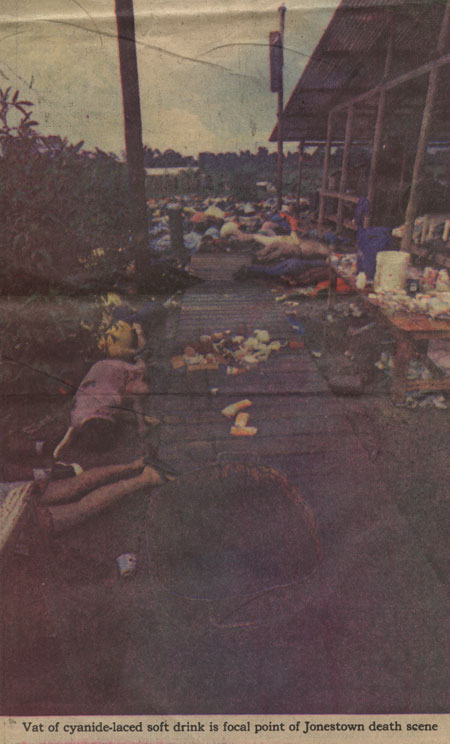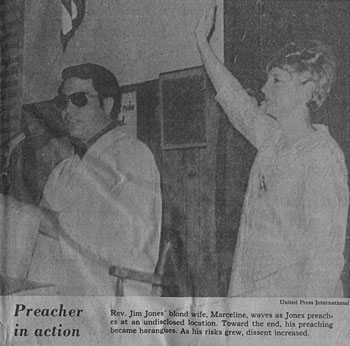Toward the end, Jones slipped
from reality into fantasy world
San Jose Mercury News - November 29, 1978, front page
Last of a series
By Pete Carey
Staff Writer

JONESTOWN, Guyana -- Toward the end,
the Rev. Jim Jones was two men -- the man he thought he was and
the man he had become.
Surrounded by a following that, through
fear and increasing dependence, showered him with personal attention,
Jones slipped away from reality.
Maybe there never was a solid reality
in the rain forests for a fast-talking minister-hustler from
Lynn, Ind., who expanded his vision to Indianapolis, Ukiah and
then San Francisco before moving on to Guyana.
Jones increasingly used drugs, and as
the morphine oozed through his veins he stumbled around his empire
in a daze.
"I watch your pain and it tears
me up," wrote Tish Leroy, a key committee member at Jonestown.
Her thoughts were in a self-analysis sent to Jones in May or
June of this year.
"You complain that we watch your
every move and judge you -- and it's true," she wrote. "Certainly
I am guilty of that . . . I make allowances for what I see you
doing that seems other than it should be, and on the other hand
I watch your pain and it tears me up inside."
Nearly all of the approximately 1,000
members of the camp had watched their "father" with
growing concern after he arrived with his flock in June 1977.
By that time his paranoia was full blown.
Alarmed at media investigations of his organization and consumed
with hatred for the United States, he finally decided to leave
for the South American jungle hide-away he had first heard about
in 1961 in an article in Esquire. It was written when The Bomb
was the monster and sudden death by nuclear blast appeared to
be the human race's most likely post mortem.
There were nine places in the world,
according to the magazine, where it would be safe to live in
an atomic war. One was Guyana.
"He told me he had been thinking
about coming to this place for 16 years, and he showed me on
a map," said Richard Clayton, one of the survivors of the
final cyanide-laced Kool-aid holocaust. "I think he had
this planned out all the time."
Now, after the bloody extinction of a
sect that was 80 to 90 percent black, Clayton thinks Jones may
have been a secret racist determined to enslave and kill as many
blacks as he could.
There is no question that the hierarchy
of Jonestown was designed along racial lines.
But was he designing a plantation or
was he simply a demented man whose beliefs had begun to twist
crazily -- a philosopher of death holding a knife at the throat
of his students?
"Hey, man, I don't know the answer
to that," said another survivor, Robert Paul. "All
I know is I was a field nigger."
Blacks held the laboring jobs in Jonestown
and whites had the office jobs.
"He really only trusted whites,"
said Juanita Bogue, a 21-year-old survivor who was one of two
whites out of 75 persons who worked in the fields. Her sister
was the other.
"If a black person accused a white
person of being a racist, the way Jones responded would make
you think he was a racist himself. His most trusted workers in
the radio room, the office, were all white. It seemed like he's
pit the whites against the blacks."
On one of his harangues, with the
flock assembled in the meeting area they had constructed, Jones
would argue that whites should be consumed with guilt because
they had made the blacks suffer. At the same time, he'd say that
his best workers were white.
"To me, that was pushing racism,"
said Ms. Bogue. But there was no objection.
"People thought Jones could read
their minds," she said. "When they passed by him, they
would put all the bad thoughts out of their minds, so he wouldn't
know. You have to understand that there were some fairly simple
people out there."
Once he arrived in Guyana, as best as
can be determined, Jones never left his jungle empire. He had
drawn a crowd with religious proclamations on the steps of a
Georgetown Catholic Church when he first arrived, had met with
people in the Guyanese capital, and then had left for the interior
and Jonestown.
Through the window of a plane droning
over Guyana's northwest section the eye takes in two colors:
blue, the sky, and a deep green, the jungle. It is thick, and
stretches away for miles. The little cleared strip at Port Kaituma,
where U.S. Rep. Leo J. Ryan and his party arrived to touch off
the beginning of the end, appears as an island. There is no escape.
Jones apparently wanted it that way to control his flock.
The combination of isolation and power
did strange things to Jones. His sect had always meted out discipline.
At Redwood Valley near Ukiah, infractors had to strip nude and
swim across a pool in front of the congregation. In San Francisco
there were beatings -- and rumors of worse.
But in Jonestown the discipline became
an end in itself.
"They never did kill anybody, but
they'd torture the hell out of them," said Paul.
"You didn't have n freedom. You
couldn't leave, and if you talked about it you'd get a beating
and be put on public service," one of Jones' punishments.
Gerald Parks, 45, from Suisun, recalls
a tour of public service. "The crime was talking about the
United States, and about going back to it. I really got hammered
for it, and then they put me on public service."
Parks was dragged out of bed at 5:30
after sleeping on the floor in his little jail, and his assignment
was digging ditches under guard -- all day long, without a break.
"You couldn't raise up to rest,"
he said.
Behind it all was Jones' need to build
a productive society. He wanted more and more from his people,
and he got it. The incredible fact is that Jonestown, with its
$7 million is assets, was constructed in less than 6 months,
starting in August 1977.
The work left people exhausted. As the
village took shape they would struggle back to camp and eat,
listen to Jones lecture for the evening, do whatever else he
bid them, and then fall exhausted into bed.

The most skilled carpenters in the
community built their leader a house. Down a meandering garden
path, away from the community, Jones could sit in it and pore
over his files, use his drugs, dream up new fantasies to practice
on his flock, and meet with his male and female lovers.
It had a screened porch, an unthinkable
luxury in a community where people were housed 14 to a room in
10 by 12 foot cottages.
Isolation, power and worship. Jones used
the combination to create fantasy.
"The first time I saw you, Father,
I knew my life would be changed," wrote one young woman
camp member. "I was caught up by a ray of sunshine, filled
with gold dust motes, as warm and comforting as honey, was literally
saturated with it, found myself above the congregation, turning
in this warm ray of love . . . thank you, Father, thank you for
the freedom I feel."
Jones began to brag to his followers
that some of them were begging him for sexual favors. He had
to grant them, he said, but only to keep them from leaving.
Gerald Parks recalled that "all
of us had to admit to being homosexuals. Then we found out it
was him. He was going with guys. The leaders of the whole show
were his lovers, and they'd brag about it right up front to us."
Jones began to lecture the group about
the virtues of homosexuality. He urged people to pair off with
persons of the same sex, explaining that it didn't produce babies.
The sexual politics of Jim Jones reached
a crescendo during one camp meeting when, seated on his throne,
swathed in blankets that even covered his head, he announced
that a man who worked as a mechanic and a young woman who worked
in the bakery had touched one another.
"We weren't supposed to have a relationship
without clearing it through a screening committee first,"
recalled Ms. Bogue. "Most people didn't pay any attention
to that, and the main thing was that no one had any time for
relationships. After working in the fields, attending meetings,
and going to lectures, all you had time to do was fall in bed.
"At any rate, these two people were
called in front of everyone. Jones said they had been seeing
each other. Apparently someone saw the boy over at the bakery
and had reported that the girl had given him a cookie. That became
a big rumor, and pretty soon people were saying they were in
love. The funny thing about it is that they weren't. They hardly
knew each other.
"But Jones wouldn't hear that. He
said if they were so excited by each other, they could make love
right here and now. They brought in a mattress, made them take
off their clothes and get down on it, but it didn't work."
In the isolation of his jungle empire,
Jones had begun to use his people like playthings. He toyed with
them, these simple people with only a rare high school graduate
among them, telling them ghostly stories about the world outside
and tightening discipline with rough twists of the screw.
His handpicked guards carried guns around
the camp. People were forced to conform to every thought that
Jones proclaimed.
Meanwhile, Jones was lost in a cloud
of pharmaceutical vapors. The camp began to smell like a drug
cabinet.
Fluttering in the muck of the meeting
hall a few days ago was a tiny corner of paper with a note jotted
on it. The paper had been used on one side to answer a quiz on
a socialist revolutionary activities.
"1. Fifth anniversary, Allende.
. . . 2. Socialist destabilize. . . . 3. French guillotine. .
. . 4. Organized rebellion in Nicaragua."
On its back was the note, probably passed
to someone at the meeting:
"I keep smelling a whiff of formaldehyde.
Do you have any idea where it might come from? Jack."
The last chapter of the Jonestown
story really starts 150 miles to the south, in a Georgetown courtroom,
where a case was brought by Grace Stoen, who had fled Jonestown
without her child, John. She wanted him back. But Jones believed
he was the child's father and said he would die rather than give
him up.
In early September, legal proceedings
began.
On Sept. 9, horns and sirens ripped through
a muggy jungle day and guards with guns ran through the camp,
ordering everyone to meetings.
A wild-eyed Jones faced his rag-tag army.
The village was about to be attacked by mercenaries, he said.
They were trying to take some of the children away, including
his son John. It would be a fight to the death.
The camp advanced to its perimeters,
waiting through the night for an attack that never came.
"We were supposed to kill the person
next to us, if they ran away during the battle," Juanita
Bogue said.
The alarms and attacks were repeated
again and again during coming weeks. Jones told them he was defending
the children.
"This was set up to look like it
was over the custody case of a lot of children. But you had the
feeling it was just over John," said Ms. Bogue.
The tensions in the camp became almost
unbearable, as one white night -- Jones gave the alarms this
name -- followed another.
At the white night meetings, they would
rehearse taking poison. Suicide had become Jones' obsession.

Jonestown also had become a financial
drain. The Social Security checks for the elderly, the checks
for the mentally disabled and veteran's benefits for others came
to $60,000 a month. It wasn't enough.
Members of the People's Temple canvassed
Georgetown for contributions. The Jonestown band played at dances.
Jones still wanted more money.
He finally crawled into the shell of
his house and muttered piteously to his flock over a field telephone
hooked to the public address system:
"I love you. I'm working so hard.
I stayed up for 14 hours for you, doing paper work. I'm weak.
I'm dying. But I love you."
In an already disordered psychological
milieu, the broadcasts of a sick leader were like sandpaper on
ray nerves. And when he emerged from his house occasionally,
the camp was confronted by a man who looked physically healthy
and rested. He would insult and abuse and conduct punishments
for anyone who talked of returning to the states.
"Humiliation from one we love
is much harder to handle than humiliation from an outsider,"
wrote Tish Leroy to her "dad," the Rev. Jones. "Though
I can always justify the lies that get told, I deeply resent
being told them. I understand the end justifies the means.
"The undersurface of me resents
being stifled and stopped in expressing. We are not really allowed
to give honest opinions for these are dictated as policy, and
it is treasonous to have differing thoughts. Yet I can give you
a whole list of 'wrong ideas' I did express to the tune of being
blasted and humiliated for it and told how wrong I was, only
to watch events prove me right. But I grow weary of humiliation,
and am no longer willing to be blasted for honesty."
Ms. Leroy, dissenter, warned Jones that
she would invite confrontation but only at the worst impasse,
only when "there is really a desperate loss endangering
the collective." Then, "I will speak out regardless."
The time undoubtedly came soon.
Ms. Leroy was unusual. People were normally
afraid to be honest with Jones. But the self-analyses were the
one place where they were afraid not to be.
"They thought he could read minds,"
said Jim Bogue, 46, of Suisun. "My kids put me wise to him.
We were planning an escape for two months and they said he sure
as hell would have picked it up. So I realized he couldn't do
it."
It's possible that Jones had just the
opposite trait. He was so wrapped up in his own mind and its
fantasies that he had barely any perception of what his people
were thinking. The self-analyses were his only chance to find
out, to weed out dissent, to calculate his risks.
Toward the end, his risks were growing.
Dissent was running high. By now, he believed that Grace Stoen
had hired mercenaries to attack the camp, and he told people
that bullets had been fired past his head.
Tim Carter, 28, of Burlingame, a farmer
heroin addict who became Jones' "PR" man in Georgetown,
said he was standing beside Jones one day when a bullet whisked
past him.
Jones made plans for leaving. Not alone,
but with everyone.
"He said we had a pretty close working
relationship with Cuba," recalled Mr. Bogue. "He said
we could go to Cuba any time." Any time turned out to be
a few weeks later. "He started loading people onto trucks
to go to the boat. The old folks were supposed to ride in the
trucks and the others were going to walk 15 miles to Port Kaituma,"
she said.
"He was so crazy. Off we went. He
took one trailer load out and the rest of us stood in line for
hours."
The trip was canceled, and the line forming
in the heart of the Guyana jungle for a trip to Cuba broke up
and everyone went back to bed.
Then Jones announced the group was leaving
for North Korea. And then for Africa.
At this point, after a successful life
of drawing thousands of dollars and people to his side, Jones
faced the bitter end. Grace Stoen had drawn attention to his
jungle hell. Rep. Leo Ryan was planning an excursion to Jonestown
and a congressional investigation.
Jones fidgeted and protested the visit.
He wavered, and finally allowed Ryan to enter. It was the end
when he allowed Ryan to walk in the crack the spell.
Jones had known it would happen this
way. A package he'd ordered had arrived the week before Ryan's
visit, and Richard Clark, a laborer, stored it away in the warehouse.
It was a box of cyanide.
Ryan came to Jonestown with a group of
reporters and television cameraman. He stayed overnight, spoke
with campmates, and received an ovation when he observed that
most camp members seemed happy.
But Ryan faced an enemy, not a host.
Jones had decided to have him and the others killed.
The roar of the happy crowd was rehearsed,
the chats with camp members had been carefully staged in advance,
with one camp member playing Ryan and the other playing the role
of a contented citizen of Jonestown.
Even so, people broke ranks when Ryan
was about to leave. Nine of them wanted to leave with him.
"You should have seen Jones. He
offered us money not to leave. Anything. He couldn't believe
it. He begged us to stay," said Ms. Bogue.

But they left with Ryan and walked directly into an ambush at the nearby airstrip at Port Kaituma. Ryan and four others were killed, and Jones prepared his camp for death. The time had come for the final white night.
Home